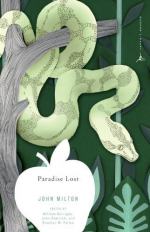|
This section contains 5,269 words (approx. 18 pages at 300 words per page) |

|
SOURCE: "Milton and His Precursors," in A Map of Misreading, Oxford University Press, 1975, pp. 125-43.
In the following essay, Bloom identifies the literary antecedents of Paradise Lost.
No poet compares to Milton in his intensity of self-consciousness as an artist and in his ability to overcome all negative consequences of such concern. Milton's highly deliberate and knowingly ambitious program necessarily involved him in direct competition with Homer, Virgil, Lucretius, Ovid, Dante and Tasso, among other major precursors. More anxiously, it brought him very close to Spenser, whose actual influence on Paradise Lost is deeper, subtler and more extensive than scholarship so far has recognized. Most anxiously, the ultimate ambitions of Paradise Lost gave Milton the problem of expanding Scripture without distorting the Word of God.
A reader, thinking of Milton's style, is very likely to recognize that style's most distinctive characteristic as being the density of its allusiveness...
|
This section contains 5,269 words (approx. 18 pages at 300 words per page) |

|


